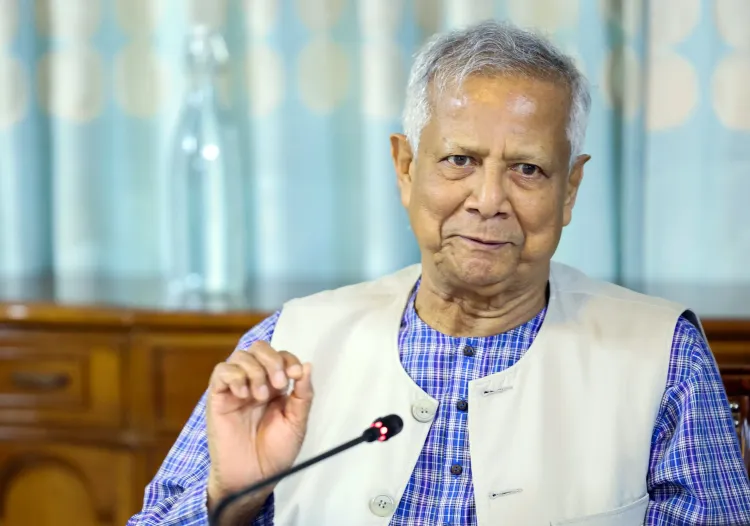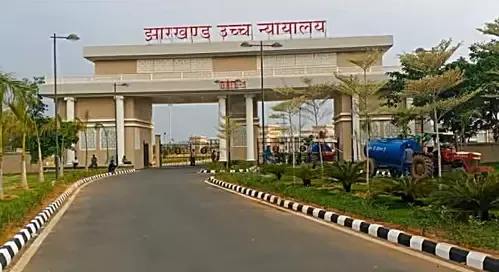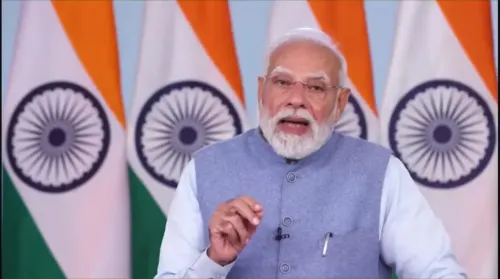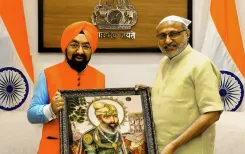Does Bangladesh's Yunus's 'Grameen' Network Have Ties to Al-Qaeda Financiers?

Synopsis
Key Takeaways
- Yunus's Grameen network may have connections to Al-Qaeda financiers.
- International inquiry has been called for to investigate these ties.
- Grameen-Jameel Microfinance is a significant player in microfinance in the MENA region.
- Controversies around the Jameel family raise questions about their financial activities.
- Allegations suggest coercive practices within Grameen Bank.
Dhaka/New Delhi, Nov 27 (NationPress) An investigative piece released by Blitz, a prominent weekly publication in Bangladesh, has claimed that Nobel laureate Muhammad Yunus's international 'Grameen' network has enduring ties with individuals flagged by Western intelligence agencies as backers of Osama bin Laden and the Al Qaeda organization.
The article, penned by Blitz editor Salah Uddin Shoaib Choudhury, is urging for a global investigation into Yunus's cross-border financial collaborations.
The report states, "For many years, Nobel laureate Muhammad Yunus has been hailed globally as a pioneer of microfinance and an advocate for the underprivileged. However, beneath this meticulously crafted international persona lies a much grimmer truth—a network of links connecting Yunus's expansive 'Grameen' enterprise to individuals identified by Western intelligence as financiers of Osama bin Laden and Al Qaeda."
Additionally, it notes, "In March 2003, The Wall Street Journal published a list of Al Qaeda financiers based on CIA intelligence, prominently featuring Mohammed Abdul Latif Jameel—a Saudi businessman and board member of Grameen-Jameel Microfinance. The report highlighted that Jameel was one of the principal funders of Osama bin Laden, recognized as the notorious architect of the September 11 terrorist attacks."
Online corporate records characterize 'Grameen-Jameel' as a social enterprise founded in 2007 as a collaboration between the Grameen Foundation and Grow Well Limited, a branch of the Abdul Latif Jameel Group. These records state that the company's goal is to "reduce poverty in the Arab region" through partnerships with microfinance entities, extending both technical and financial assistance.
The report further claims, "On its LinkedIn profile, Grameen-Jameel asserts that it was founded in 2003 and incorporated in 2007 as a partnership between Grameen Foundation and ALJ Foundation, a division of the Abdul Latif Jameel Group."
"The organization positions itself as the first social business in the Middle East, North Africa (MENA), and Turkey focused on advancing microfinance. By December 2013, it had facilitated over USD 65 million in funding, benefiting more than 2.2 million clients through partner organizations across ten nations in the MENA region and Turkey."
According to the report, the organization is registered in Cyprus and has its headquarters in Dubai's International Humanitarian City. Currently, its website is non-functional, and its Facebook page has been suspiciously shut down.
"Further reinforcing the Grameen-Jameel association is Zaher Al Munajjed, the Chairman of Grameen-Jameel Microfinance Ltd. Al Munajjed also holds a senior advisory role with Mohammed Abdul Latif Jameel, President of the ALJ Group in Saudi Arabia. With over 25 years of global business experience, he has significantly contributed to the development of vocational training and microfinance initiatives. A Harvard Business School alumnus and holder of a Master’s degree in French International Law, Al Munajjed is recognized as a key driver of microfinance growth in the MENA and Turkish regions," states the Blitz report.
The Jameel family's contentious history
As per the Blitz report, Yousef Jameel—another notable member of the Jameel family—was once infamous in London's casino scene during the 1980s. The Daily Mail reported that he was well-known as a playboy, later becoming embroiled in an international child abduction controversy.
Adding to the controversies, his name surfaced in Jeffrey Epstein's infamous 'Black Book,' which unveiled networks associated with child exploitation and human trafficking. On July 21, 2004, Jameel and others sought an appeal from the British Court of Appeal following a Sunday Times article titled 'Car tycoon 'linked' to Bin Laden' published on June 8, 2003. This article claimed that Jameel had been sued by the families of the victims of the September 11 attacks.
On February 3, 2005, Dow Jones & Co.—the parent company of The Wall Street Journal—filed its own appeal against Yousef Abdul Latif Jameel.
In a landmark verdict on October 11, 2006, the highest court in Britain sided with The Wall Street Journal, underscoring the significance of investigative journalism. The ruling emphasized that the article was published as part of a legitimate public-interest inquiry into terror financing.
The court record stated:
"Above the article and headline were images of the claimant, Mr Jameel, his company Hartwell PLC, and the Twin Towers ablaze on September 11, 2001, with the following words: 'Accused: Yousef Jameel's family firm purchased the British car dealer Hartwell in 1990. Now he is alleged to have contributed to funding the training for the terrorists who executed the September 11 attacks.'"
Despite these serious allegations, Jameel has long been viewed as a prosperous entrepreneur and "generous philanthropist." He has provided substantial funding for programs at MIT aimed at poverty alleviation and enhancing water and food security. For his philanthropic endeavors and contributions to arts and culture in the UK, Mohammed Abdul Latif Jameel was awarded an honorary knighthood by Queen Elizabeth II, a recognition announced by the British Embassy in Riyadh," asserts the Blitz report.
"However, The Guardian later revealed that a group of affluent Saudi businessmen—including individuals close to Jameel—were pursuing a libel case in the High Court over allegations that they might have financially supported Osama bin Laden's Al Qaeda network. They opted for London due to its reputation as a claimant-friendly jurisdiction for defamation cases," mentions the Blitz report.
Questionable connections of Grameen
The Blitz report also discusses allegations linking Grameen entities to the Muslim Brotherhood, further intensifying concerns regarding Yunus's international partnerships.
"Even more alarming are reports suggesting sinister connections between Grameen Bank and illicit human organ traffickers. Individuals unable to repay their loans were reportedly coerced into selling their organs to settle debts," states the Blitz report.









